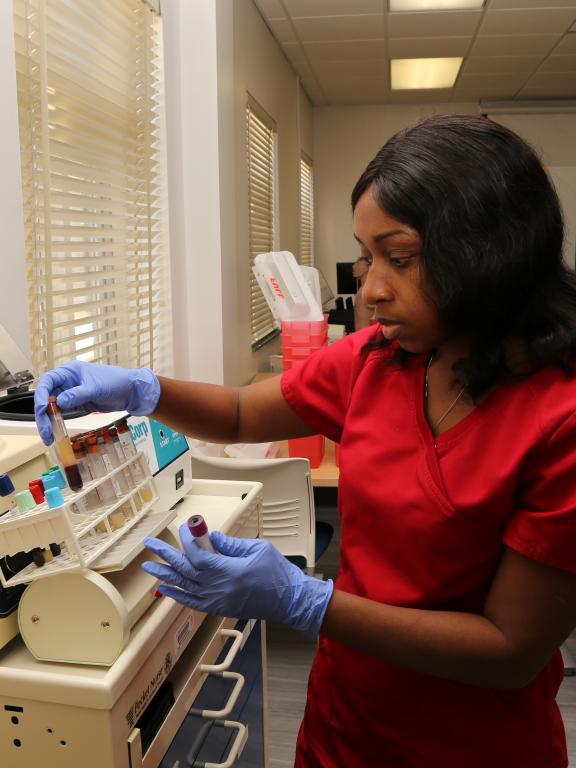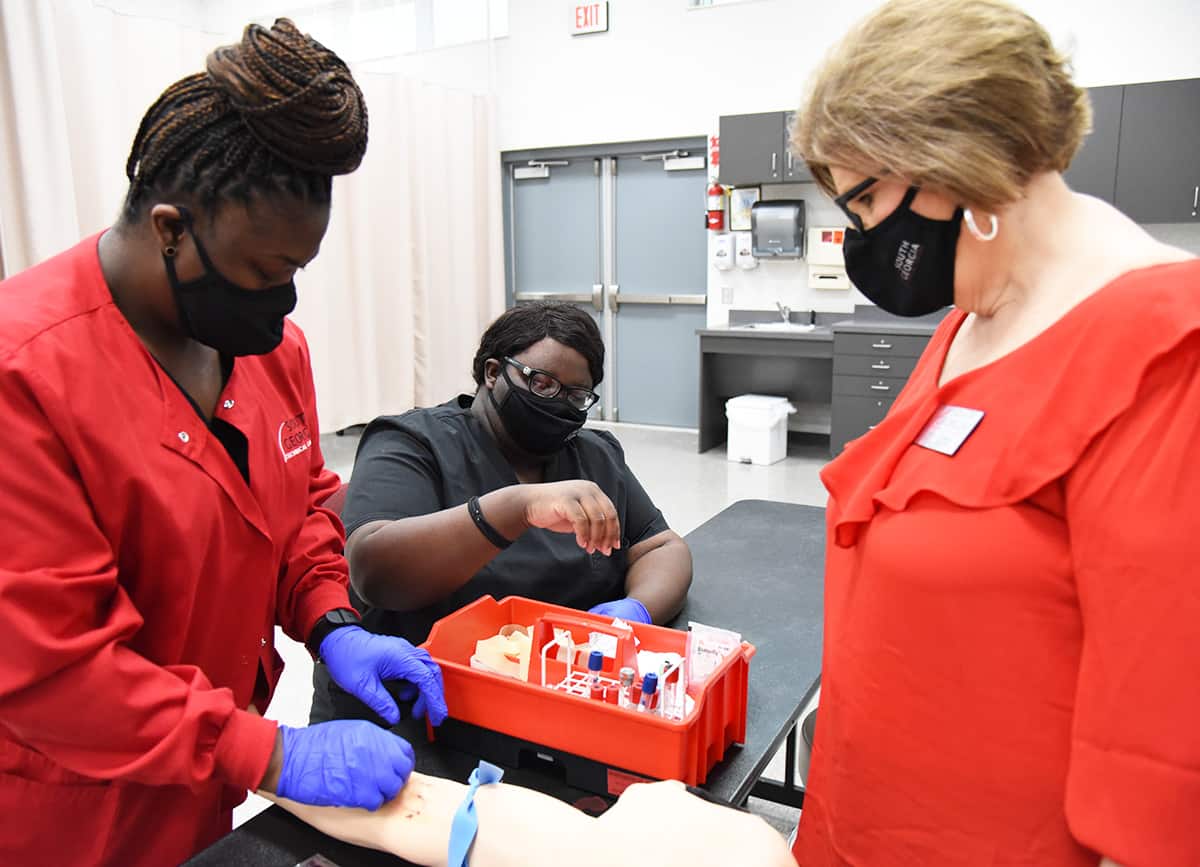Phlebotomy Classes Near Me: Factors to Consider When Picking a Local Training Option
Phlebotomy Classes Near Me: Factors to Consider When Picking a Local Training Option
Blog Article
The Course to Accreditation: Recognizing the Phlebotomy Training Training Course Trip and Its Significance
As you think about the path to certification in phlebotomy, it's important to comprehend the duty you'll play in medical care. Your training will cover essential abilities, from blood collection strategies to patient interaction.

The Duty of Phlebotomists in Medical Care
Phlebotomists play a vital function in the healthcare system, serving as the vital web link between clients and essential diagnostic screening. You'll perform blood draws, guaranteeing samples are gathered precisely and securely. Your proficiency assists in detecting clinical problems, monitoring health and wellness, and assisting therapy choices.
In your daily interactions, you'll require to establish trust with individuals, making them really feel comfy throughout what could be a difficult experience. You are in charge of identifying and managing examples carefully to stop contamination or mistakes, which could affect test outcomes.
Beyond this, you'll commonly function together with medical professionals and registered nurses, communicating crucial details about clients' problems. By mastering your skills, you contribute meaningfully to patient care, making you an important part of the medical team.
Review of Phlebotomy Training Programs
When checking out phlebotomy training programs, you'll find numerous kinds made to fit various schedules and learning styles. Each program helps you create necessary skills like blood collection and person interaction. Comprehending these alternatives is crucial to choosing the ideal path for your job.
Kinds of Educating Programs
Several kinds of training programs are offered for those seeking to become efficient in phlebotomy. You can pick from certification programs, which usually last a couple of months and focus on vital skills. There are additionally diploma programs that provide an even more extensive education and learning, frequently lasting as much as a year. If you're seeking a deeper understanding, an associate level in an associated area may be the ideal fit. Online training courses use flexibility for those balancing work or family dedications, enabling you to study at your own rate. Furthermore, some medical facilities and facilities provide on-the-job training programs, supplying useful experience while you find out. Whatever course you pick, each program aims to equip you with the necessary abilities for a successful phlebotomy occupation.

Key Skills Established
Mastering phlebotomy needs a collection of crucial abilities that are developed with extensive training programs. Furthermore, communication abilities are essential; you'll require to connect with clients, discuss procedures, and put them at simplicity. Each of these abilities is vital for your success as a certified phlebotomist, making you a beneficial property in any healthcare setting.
Trick Elements of a Phlebotomy Training Course
In a phlebotomy training course, you'll concentrate on vital subjects that prepared for your future occupation. You'll take part in hands-on training that permits you to use what you have actually learned in real-world setups. Both the core curriculum and functional experience are vital for your success as a phlebotomist.
Curriculum Summary
While going after a phlebotomy training course, you'll experience a core educational program created to outfit you with basic abilities and expertise. Phlebotomy Training Course. This educational program generally includes makeup and physiology, concentrating on the blood circulation system and recognizing blood parts. You'll also find out about various sorts of blood collection approaches, including venipuncture and capillary slit methods
In addition, infection control and safety methods are important elements, guaranteeing you recognize exactly how to maintain a sterilized setting. You'll research patient communication, emphasizing interaction and empathy, which are crucial for alleviating person anxiousness.
Hands-On Training Experience
Getting hands-on experience is an essential component of your phlebotomy training program. This sensible training allows you to use what you have actually discovered in a real-world setup, improving your skills and self-confidence. Phlebotomy Training Course.
Additionally, you'll get the chance to connect with individuals, which is necessary for creating your interaction skills. This combination of technological efficiency and social skills is vital for your success as a certified phlebotomist. Inevitably, hands-on training is where concept satisfies method, solidifying your expertise and preparedness for certification.
Qualification and Licensing Needs
Before you can begin your occupation in phlebotomy, it is essential to understand the accreditation and licensing demands that differ by state. Many states need phlebotomists to hold a certification from an acknowledged company, such as the National Phlebotomy Association or the American Society for Scientific Pathology. These qualifications normally involve passing an examination that examines your understanding and skills in the area.
In addition to certification, some states have specific licensing requirements. You may need to finish a particular variety of hours in clinical technique, send evidence of training, or undergo a history check. It is necessary to research your state's guidelines to make sure you meet all required requirements.
Staying notified concerning these requirements not just assists you safeguard a setting however likewise enhances your credibility as a specialist. By satisfying these needs, you'll be well on your method to a successful occupation in phlebotomy.
Hands-On Training and Practical Experience
Hands-on training and Phlebotomy Training Course practical experience are necessary elements of your phlebotomy education, as they permit you to apply academic expertise in real-world circumstances. Throughout your training, you'll participate in monitored venipuncture, learn appropriate strategies, and end up being acquainted with numerous blood collection devices. This direct participation is crucial for developing your confidence and honing your skills.
You'll work very closely with seasoned professionals who can guide you through the nuances of patient communication and sample handling. Each session not just reinforces your understanding however additionally prepares you for the busy atmosphere of healthcare setups.
Furthermore, many programs integrate scientific rotations, allowing you to experience varied setups, from health centers to outpatient facilities. This exposure helps you adapt to different difficulties and patient demands, guaranteeing you're well-prepared for your future role. Accept these opportunities, as they're important to ending up being a proficient and caring phlebotomist.
Challenges Faced During Training
While acquiring hands-on experience is vital, it's vital to acknowledge the obstacles that can arise throughout your phlebotomy training. In addition, grasping the skills needed for blood attracts takes practice; you may struggle with method initially.
Time administration can also be a difficulty, as harmonizing theory, sensible sessions, and personal commitments can really feel daunting. You might face differing discovering rates amongst your peers, resulting in feelings of insecurity if you think you're falling behind. Finally, adjusting to the various personalities of teachers can be difficult, as each might have a distinct training style.
Recognizing these obstacles at an early stage can prepare you for success and assist you create resilience throughout your training journey.
Occupation Opportunities After Certification

As you obtain experience, you may even consider focusing on areas like pediatric or senior citizen phlebotomy, accommodating specific person demands. Some phlebotomists choose to progress their professions by becoming lab technicians or seeking further education and learning in health care fields.
Furthermore, your qualification can lead to functions in training or managing brand-new phlebotomists, permitting you to share your knowledge. With the healthcare industry continuously growing, your skills will always be in need, leading the way for a secure and fulfilling profession. Accept the possibilities waiting for you!
Regularly Asked Questions
What Is the Common Period of a Phlebotomy Educating Program?
Phlebotomy training programs generally last around four to eight weeks. You'll participate in hands-on practice, class guideline, and on-line discovering. Finishing this training prepares you for qualification and a satisfying profession in medical care.
Are Online Phlebotomy Courses Available?
Yes, on-line phlebotomy training courses are offered. They provide flexibility and comfort, permitting you to research at your own pace. Simply validate the program is recognized to satisfy accreditation requirements and acquire beneficial skills for your career.
Exactly How Much Does Phlebotomy Training Generally Cost?
Phlebotomy training commonly costs between $700 and $2,500, relying on the program and place. You should think about factors like program size, included products, and hands-on experience when choosing the ideal training for you.
What Prevail Prerequisites for Phlebotomy Training?
Common prerequisites for phlebotomy training often include a secondary school diploma or GED, booster shots, and a background check. Some programs may additionally call for standard healthcare knowledge or certifications, guaranteeing you're planned for hands-on training.
Can I Function While Finishing My Phlebotomy Training?
Yes, you can work while completing your phlebotomy training. Many pupils balance jobs with their researches, however ensure to handle your time properly to ensure you meet both job and training dedications efficiently.
Report this page